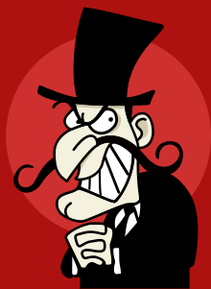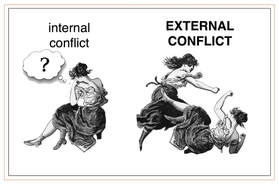Villains!! Image Source: Wikipedia Image Source: Wikipedia I’ve mentioned it a few times on my Facebook page, but I LOVE a good villain. Nothing is more disappointing for me as a consumer of literature/film/comics or as a writer as when a story has a weak, dull, or stereotypical villain. With that in mind, let’s talk about how you can make a good villain for your story and how I go about fleshing out mine. Firstly! Like with your MC, your big bad needs a backstory. How did he come to the point he’s at now? Why did she turn to a life of crime? What does the villain have against the MC? Where did their paths cross? Is their struggle something intimate or is it more grand and large scale? Examples of MC to villain interaction is something like cops and robbers, hero and villain, arch enemies, rivals, parent and child, school bullies, century old grudge, the hero spilled coffee on the villain at just the wrong time and now they want him/her dead! Okay, that last one was a bit over the top, but if you set your villain up as someone who is on the verge of breaking it could work. For me, I mostly use a business or family approach to my villains. In Galaxia Pirates my primary villains are the mercenary group the Red Falcon crew, and the Allied Navy. Seeing as the “heroes” of the story are pirates it would make sense their primary foe would be a form of law enforcement. The Red Falcon and crew get involved because they are often taking a job that puts them in direct opposition with the Galaxia Pirates. In Itáyu Lake, the first antagonist is Jason Strand’s own family. Fueled by a centuries old grudge and misguided hate the family is bitter and prejudice. Jason’s life was hard because of his father’s views, views his siblings later reflected and pushed onto him.  Image Source: Google Image Search Image Source: Google Image Search Your antagonist should be just as complex, if not more so, than your protagonist. I’m not saying you need to give your reader the complete life story. They don’t need to know how their first pet goldfish died and their parents just left him in the bowl to be found later… unless that plays into their spiraling path of seeing the world as a fleeting nothingness. See! Any little thing can lead to a good starting point of villainy. Personally, I love the intimate connection with the hero. As I said, in Galaxia Pirates one of the primary antagonists are often put into the Galaxia crew’s path because of the jobs they take, but the captain of the Red Falcon has a past with the Galaxia’s captain and first mate. This personal connection drives him to greater leaps in logic when handling them. He wants his revenge! Revenge is a perfectly acceptable drive for your villain. Revenge also works well for a hero. Maybe they both see the other as having wronged them and they want mutual revenge against each other? The part you focus on and show in the more positive light would show which is your hero vs villain. Remember, a lot about your villain is perspective. Another example from my own writing, in the first Itayu Lake book, A Dragon’s Dream, Jason’s brother Jared is shown to be an antagonist. He’s against Jason’s mating to Mikhail. He even seems to share his father’s prejudice opinions. He’s completely unlikeable! Until he gets his own story and the reader gets to see things from his perspective in the second book of Itáyu Lake, A Cougar’s Cry. Then he goes from being a villain to a sympathetic victim that you want to cheer for. So, quick recap. You villains needs a backstory that justifies their actions. Some kind of connection with the hero needs to be made, even if it is only in passing. Use the correct perspective to frame your villain.  Image Source: clipartfest.com Image Source: clipartfest.com Now, for a final bit of advice, that’s a bit contradictory to what I just said. You story doesn’t need to have a villain. The conflict between the two characters, say in a love story, can push your plot along just fine. Villains are more for an external conflict. If you’re going for more of an internal thing, then you can bypass the villain entirely and just focus on what your character is going through, and the conflict he’s fighting within himself. Of course all good stories have both an external and an internal conflict. Whether you chose to use a villain or not though, the tone should fit and be something that flows with the entirety of your narrative. It doesn’t make sense to suddenly have a villain thrown in the middle of your book if you haven’t lead up to it. So it’s always a good idea to think about the story as a whole and whether or not a villain is needed to propel the plot forward. Good luck!
0 Comments
Leave a Reply. |
A.M. HalfordMondays: Free post days where I post about anything I feel like talking about. Archives
May 2018
|

 RSS Feed
RSS Feed